| About | Registration | Program | Speakers | Accommodation | Getting here |
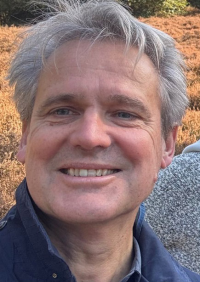 Day 1, 2024.12.09., 17:00-17:45 Parallel session: What is the main challenge for you in engaging in national and international cooperations?
Day 1, 2024.12.09., 17:00-17:45 Parallel session: What is the main challenge for you in engaging in national and international cooperations?Professor in Molecular Pharmacology, Department Translational Neuroscience, University Medical Center Utrecht . Scientific advisor at Rintveld Eating disorder clinic (Zeist, NL). Guest professor Sahlgrenska Academy, University of Gothenburg, Sweden. Member Netherlands National Committee for the protection of animals used for scientific purposes (NCAD). Trained as molecular neurobiologist I use a variety of strategies (chemogenetics, viral vector technology, fiber photometry, optogenetics, scRNAseq) to unravel the mechanisms underlying (feeding) behavior.
Selected Publications (Google scholar Citations: 20176; h-index:76; i10-index:235) related to policy:
Adan RAH, Cirulli F, Dye L, Higgs S, Aarts K, van der Beek EM, Buitelaar JK, Destrebecq F, De Witte E, Hartmann T, Korosi A, Libuda L, Dickson SL. Towards new nutritional policies for brain health: A research perspective on future actions. Brain Behav Immun. 2022 Oct;105:201-203.
Homberg JR, Adan RAH, Alenina N, Asiminas A, …, Wolvekamp M, van der Zee EA, Genzel L.The continued need for animals to advance brain research. Neuron. 2021 Aug 4;109(15):2374-2379.
Schmidt U, Adan R, Böhm I, …., Kas MJ, Seitz J, Smeets P, Sternheim L, Tenconi E, van Elburg A, van Furth E, Zipfel S. Eating disorders: the big issue. Lancet Psychiatry. 2016 Apr;3(4):313-5.
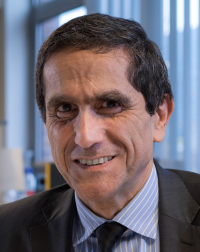 Day 2, 2024.12.10., 13:30-14:00 Plenary presentation: Introducing the Designing of a European Brain Health Landscape project
Day 2, 2024.12.10., 13:30-14:00 Plenary presentation: Introducing the Designing of a European Brain Health Landscape projectPhilippe Amouyel, MD, PhD, is the Chair of the EU Joint Programme on Neurodegenerative Disease Research (JPND), a collaborative initiative involving 30 countries, including Canada and Australia, aimed at addressing the challenges of neurodegenerative diseases, particularly Alzheimer’s disease. JPND unites nations to tackle issues that transcend the capacity of any single country. A neurologist by training, Dr. Amouyel is a Professor of Epidemiology and Public Health at the University Hospital of Lille in France. He leads a prominent academic research unit specializing in the public health and molecular epidemiology of aging-related diseases. His work focuses on decoding the susceptibility to aging diseases through advanced molecular techniques such as high-throughput genomics, transcriptomics, proteomics, and bioinformatics. His research primarily explores the genetic determinants of neurodegenerative diseases, with a strong emphasis on Alzheimer’s disease. He has contributed to the discovery of over 90% of the published genetic susceptibility factors for Alzheimer’s disease (H-index: 123). From 2002 to 2011, Dr. Amouyel served as the Director of the Institut Pasteur de Lille. Since 2008, he has been the General Director of Fondation Alzheimer in France, a private non-profit foundation dedicated to supporting innovative and cutting-edge research on Alzheimer’s disease and related disorders.
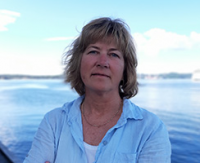 Day 1, 2024.12.09., 13:00-13:45 Panel discussion: Setting the scene: Towards a holistic approach of European Brain Health research
Day 1, 2024.12.09., 13:00-13:45 Panel discussion: Setting the scene: Towards a holistic approach of European Brain Health research
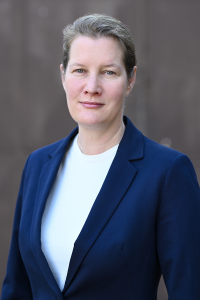 Day 2, 2024.12.10., 9:30-10:30 Pieces of the same puzzle: Good practices and recommendations for pan-European joint efforts from the European Brain Health research initiatives
Day 2, 2024.12.10., 9:30-10:30 Pieces of the same puzzle: Good practices and recommendations for pan-European joint efforts from the European Brain Health research initiatives
Day 2, 2024.12.10., 13:45-14:30 Plenary session: Introducing the Designing of a European Brain Health Landscape project
Dr. Ulrike Busshoff is Head of the International Health Research Department at the DLR Project Management Agency, Germany. She oversees national, European and international research funding programmes in the area of brain health and global health. Besides conceptualizing and executing research funding programs on behalf of the German Federal Ministry of Education and Research she is also responsible for overarching topics like patient and public involvement, quality assurance in biomedical research, and ethical issues.
Dr. Busshoff is the coordinator of the ERA-Net NEURON that comprises ministries and funding agencies from 27 countries in and beyond Europe. Members in this network collaborate along a common research agenda, and with support by the European Commission to jointly fund research, networking and training activities in the area of neurological and mental disorders. Since 2023, Dr. Busshoff is also the coordinator of the CSA BrainHealth. This network conceptualizes and prepares the European Partnership for Brain Health. This large-scale endeavour will support brain health research and innovation with the ultimate goal to preserve and promote brain health. She serves also as member of the Advisory Board EU-Africa PerMed, a CSA fostering joint projects in personalised medicine research between Europe and Africa. Dr. Busshoff holds a PhD in neurobiology from the University of Heidelberg.
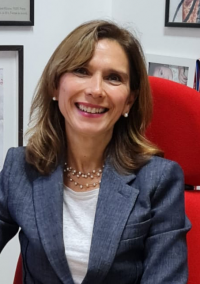 Day 1, 2024.12.09., 14:15-15:15 Panel session: Global Dialogue in Brain research
Day 1, 2024.12.09., 14:15-15:15 Panel session: Global Dialogue in Brain researchDay 1, 2024.12.09., 17:00 – 17:45 What is your story? Stakeholders in Brain Health research interactive session: Session 4. What are the gaps in Brain health research and how to address them?
Francesca Cirulli is Research Director at the Center for Behavioural Sciences and Mental Health, Istituto Superiore di Sanità, Rome, Italy. Her research focuses on the study of biomarkers of risk and resilience for mental disorders with a specific focus on the role of stress. She is carrying out preclinical and clinical research investigating shared biomarkers between psychological stress and metabolic stress from a lifelong perspective, addressing more broadly the role of lifestyle in the prevention and treatment of mental disorders. She Chairs the Nutrition Network of the European College of Neuropsychopharmacology. She has been the President of the European Brain and Behavior Society (EBBS) and the Treasurer of the Federation of European Neuroscience Societies (FENS).
She is Chair of Alba Network, a division of FENS engaging the global neuroscience community, promoting diversity and equity in Brain Sciences. She is Senior Editor for Neuroscience and Biobehavioral Reviews and Neuroscience Applied and was recently appointed Chief Editor of Neuroscience, the IBRO Journal.
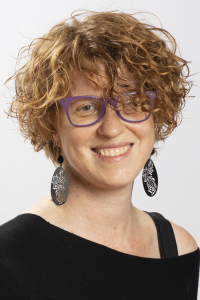 Day 2, 2024.12.14., 10:30-11:00 Spotlight on success stories of European research projects presented by early career researchers
Day 2, 2024.12.14., 10:30-11:00 Spotlight on success stories of European research projects presented by early career researchersLisa Genzel studied Medicine at the Ludwig Maximilian University in Munich, Germany. In parallel she performed her MD thesis on sleep related memory consolidation in humans at the Max Planck Institute of Psychiatry. She then first did a short post-doc at the Max Planck Institute before moving to Edinburgh and working in the lab of Richard Morris with rodent models.
She became a Branco Weiss Fellow in 2014 and moved to the Donders Institute at Radboud University in the Netherlands in 2017, where she took up an Professor position and started her own lab.
She received numerous honours such as the Early Career Scientist Award of the German Sleep Research Foundation in 2015, the prestigious Dutch VIDI starting grant in 2018, Radboud Science Award in 2022, ERC consolidator grant in 2023 and became Chair of the FENS Kavli Network of Excellence in 2024.
Her research focus is understanding how memories of individual experiences transform into knowledge and prediction networks using a translational, cross-species approach.
 Day 1, 2024.12.09., 16:00-16:50 Parallel session 1: Discovery neuroscience research as a foundation for brain health
Day 1, 2024.12.09., 16:00-16:50 Parallel session 1: Discovery neuroscience research as a foundation for brain healthBalázs Hangya was trained as a medical doctor at Semmelweis University, Budapest and received his MD degree in 2006. In parallel he was also trained as a mathematician and received a master’s degree in Probability Theory and Statistics from Eotvos Lorand University, Budapest in 2007. He joined the laboratory of Tamas Freund at the Institute of Experimental Medicine, Budapest, where he worked on the neural mechanisms of hippocampal and neocortical oscillations. He received his PhD in Neuroscience in 2010 from the Janos Szentagothai Doctoral School. Hangya spent four and a half years in the United States as a postdoctoral researcher in the Kepecs lab at Cold Spring Harbor Laboratory where he studied the role of the basal forebrain cholinergic system in attention and learning. He started his independent laboratory in the Institute of Experimental Medicine, Budapest in 2015, investigating the neuromodulatory control of cognitive functions including learning and decision making.
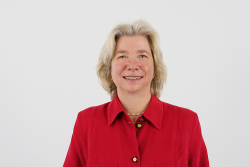 Day 1, 2024.12.09., 17:00 – 17:45 What is your story? Stakeholders in Brain Health research interactive session: Session 1. How do you see the benefit of European research efforts in your daily work?
Day 1, 2024.12.09., 17:00 – 17:45 What is your story? Stakeholders in Brain Health research interactive session: Session 1. How do you see the benefit of European research efforts in your daily work?Sabine Hölter-Koch is a neurobiologist and group leader at the German Mouse Clinic at Helmholtz Munich. She graduated from the University of Tübingen with a Ph.D. in Behavioural Pharmacology and completed a habilitation in Behavioural Neuroscience at Technical University Munich, where she is teaching Behavioural Biology. Her research into translationally relevant aspects of genetic mouse models aims to unveil pleiotropic gene functions and the genetic contributions to neurodevelopmental, neurodegenerative and rare diseases to identify new treatment options. This work involves behavioural, brain histological and bioinformatic approaches, often in interdisciplinary projects with human geneticists, neurologists or psychiatrists. She is Vice Chair of the International Mouse Phenotyping Consortium, chair of the ECNP Preclinical Data Forum Network, PI in the German Centre for Mental Health (DZPG) and coordinator of EBRA’s PREMOS cluster. She also serves as Science Communication Coordinator of COST Action CA20135 which advances automated monitoring technologies for biomedical research and animal welfare, and as member of the EBRAINS Science & Technology Committee.
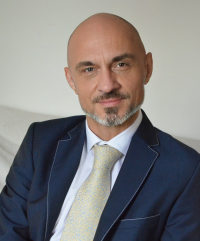 Day 1, 2024.12.09., 17:00 – 17:45 What is your story? Stakeholders in Brain Health research interactive session: Session 1. How do you see the benefit of European research efforts in your daily work?
Day 1, 2024.12.09., 17:00 – 17:45 What is your story? Stakeholders in Brain Health research interactive session: Session 1. How do you see the benefit of European research efforts in your daily work?Day 2, 2024.12.10., 11:30-12:30 Parallel session 3: Patient organizations’ involvement in Brain research cooperation
Kéri Péter, a teacher and PR expert, is responsible for international relations, grants, and innovations at the Ébredések Alapítvány, Hungary. He is president of GAMIAN-Europe, the largest patient-driven organization on the continent supporting individuals facing mental health issues, and a Member of the Board of the European Psychiatric Association and the European Brain Council. He collaborates closely with several prominent organizations, including the WHO European Office, the OECD, and King’s College London. Through GAMIAN-Europe’s extensive network of member organizations spanning the entire continent, Kéri has a comprehensive understanding of the diverse aspects of patient involvement in mental health care systems. As president of GAMIAN-Europe, Kéri considers his most important mission to be fostering a deeper understanding of patients' lived experiences among all stakeholders in the mental health ecosystem. By doing so, he aims to promote better recovery outcomes and more effective support structures. His work emphasizes identifying and addressing the barriers to recovery that patients face post-diagnosis, with the goal of reducing these challenges on a country-by-country basis across Europe. A dedicated advocate and speaker, Kéri regularly shares his insights at international conferences and contributes to advancing the field through research and publications.
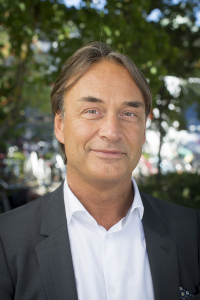 Day 1, 2024.12.09., 16:00-16:50 Parallel session 2: Incentivizing the translation of research results into practice. Where are the bottlenecks and how to overcome them?
Day 1, 2024.12.09., 16:00-16:50 Parallel session 2: Incentivizing the translation of research results into practice. Where are the bottlenecks and how to overcome them?Day 1, 2024.12.09., 17:00 – 17:45 What is your story? Stakeholders in Brain Health research interactive session: Session 4. What are the gaps in Brain health research and how to address them?
Niklas Marklund is the Professor of Neurosurgery at Lund University, Sweden. Dr. Marklund completed his PhD on experimental traumatic brain injury (TBI) research in 2001, and his neurosurgical residency in 2002 in Uppsala, Sweden. He was then a post-doctoral fellow at the Dept. of Neurosurgery, University of Pennsylvania, Philadelphia, USA from 2002-2004. He was 2010-2016 the Swedish representative in the European Association of the Neurosurgical Societies (EANS) and the Chair of the EANS Trauma & Critical Care section between 2017-2021. In 2024, he was selected EANS European Lecturer and he is the current Chair of the EANS Research Fund. In addition, he is European Editor for the Journal of Neurotrauma.
Dr. Marklund is a co-founder and board member of the European Neurotrauma Organization (ENO), a co-founder and 1st chair of the Swedish Sports Concussion Society (SSCS) and since long member of the Scandinavian Neurotrauma Committee. His translational TBI research includes projects ranging from experimental in vivo and in vitro TBI studies to clinical studies on neurocritical care monitoring, sports concussion, biomarkers and human TBI pathology. A main aim is the study mechanisms for white matter injury, neuroinflammation, plasticity and neurodegeneration after TBI.
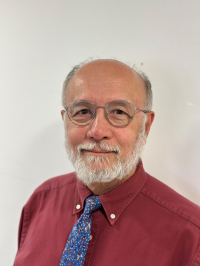 Day 1, 2024.12.09., 14:15-15:15 Panel session: Global Dialogue in Brain research
Day 1, 2024.12.09., 14:15-15:15 Panel session: Global Dialogue in Brain researchDavid Menon is Director of Research at the University of Cambridge, and an Emeritus Senior Investigator in the National Institute for Health and Care Research (NIHR). He is a Founding Fellow of the Academy of Medical Sciences (UK), and a Professorial Fellow in the Medical Sciences at Queens’ College, Cambridge. His achievements led to appointment as Commander of the Order of the British Empire (CBE) in June 2024. He was the first Director of the Neurosciences Critical Care Unit (NCCU) at Addenbrooke’s Hospital, Cambridge, where he established the first UK training programme for specialist neurocritical care. He jointly leads the EU-funded €30 million CENTER-TBI Consortium, the International Initiative on TBI Research, and the multi-funder UK national Traumatic Brain Injury (TBI) Research. He jointly led Lancet Neurology Commissions on TBI in 2017 and 2022, and was Executive Editor of the UK All Party Parliamentary Group Report on Acquired Brain Injury. He has been applicant or co-applicant on awarded grants totaling over $60 million. He has over 650 peer-reviewed publications, with a ‘h’ index of over 130 (Google Scholar) and has been continuously rated as a Highly Cited Researcher by Clarivate since 2021.
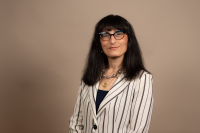 Day 1, 2024.12.09., 16:00-16:50 Parallel session 2: Incentivizing the translation of research results into practice. Where are the bottlenecks and how to overcome them?
Day 1, 2024.12.09., 16:00-16:50 Parallel session 2: Incentivizing the translation of research results into practice. Where are the bottlenecks and how to overcome them?Dr. Elena Moro is a Professor of Neurology at the Grenoble Alpes University (France). She graduated in Medicine at the University of Trieste (Italy) and completed her residency in Neurology at the Catholic University in Rome (Italy). She received her PhD in Neurosciences from the Catholic University in Rome. She is currently the Director of the Movement Disorders Center, and the Chair of the Department of Psychiatry, Neurology, Neurological Rehabilitation and Forensic Medicine at the CHU of Grenoble. Her major area of interest is surgical treatment of movement disorders, especially deep brain stimulation. She has been actively involved in the International Movement Disorders Society (MDS) and has become Honorary Member. She is currently the President of the European Academy of Neurology.
 Day 1, 2024.12.09., 16:00-16:50 Parallel session 1: Discovery neuroscience research as a foundation for brain health
Day 1, 2024.12.09., 16:00-16:50 Parallel session 1: Discovery neuroscience research as a foundation for brain healthDay 1, 2024.12.09., 17:00 – 17:45 What is your story? Stakeholders in Brain Health research interactive session: Session 3. What would you need for strengthened participation in European collaborative efforts?
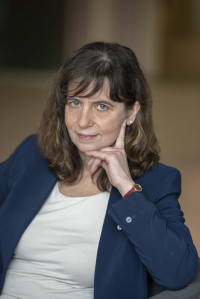 Day 2, 2024.12.14., 9:00-9:30 Recap and highlights of Day 1. Setting the scene for Day 2
Day 2, 2024.12.14., 9:00-9:30 Recap and highlights of Day 1. Setting the scene for Day 2Beata Sperlagh is the director, research professor and Head of Laboratory of Molecular Pharmacology of HUN-REN Institute of Experimental Medicine, Budapest, Hungary; honorary professor of Pharmacology, Semmelweis University, Budapest. She is the corresponding member of the Hungarian Academy of Sciences (HAS) and the Academia Europaea. She graduated as an MD at the Semmelweis University and obtained her PhD in 1994. She was a visiting scientist in the Center for Neurochemistry in Orangeburg, New York in 1991, 1992 and 1996. Her main scientific interest is neuroscience and pharmacology having major achievements by the discovery of the P2 purinergic receptors regulating neurotransmission and identification of P2X7 receptors as new drug target in psychiatric disorders. She has strong commitment to the translation of basic science findings to new therapies with established relationship with pharma companies.
She has 244 publications in international scientific journals receiving over 11000 citations. She is the Governance Chair of International Union of Basic and Clinical Pharmacology (IUPHAR) and the member of the Bioscience Steering Committee of the European Academies' Science Advisory Council (EASAC).
She is the past and present member of prestigious funding bodies including LS7 Panel of the European Research Council (ERC), and the Hungarian National Science Foundation.
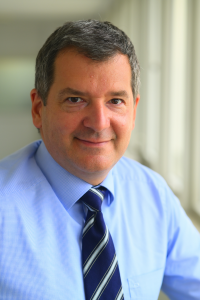 Thilo van Eimeren’s scientific curiosity lies in understanding the structural and molecular determinants of brain function in both health and disease. With the ultimate vison of preventing neurodegenerative disorders such as Parkinsonian Disorders and Alzheimer’s disease, my research aims to uncover pathogenic and therapeutic mechanisms in these conditions. To achieve this, he integrates molecular, structural and functional brain imaging techniques to provide deeper insights into disease progression and treatment effects. A significant focus is on the early detection of Parkinsonian Disorders utilizing biological and genetic markers associated with Parkinson’s disease to create precise diagnostic tools capable of detecting the condition at its earliest stages. Beyond research, he is deeply committed to translating these findings into clinical applications. This includes the development and implementation of advanced neuroimaging standards that enhance diagnostic accuracy and patient care. Collaboration is at the heart of his work. He coordinates international initiatives like the European Cluster for Imaging Biomarkers and the Neuroimaging Study Group of the International Parkinson and Movement Disorder Society. Through these efforts, he strives to bridge the gap between basic science and clinical practice, fostering innovation and improving outcomes for individuals affected by neurodegenerative diseases.
Thilo van Eimeren’s scientific curiosity lies in understanding the structural and molecular determinants of brain function in both health and disease. With the ultimate vison of preventing neurodegenerative disorders such as Parkinsonian Disorders and Alzheimer’s disease, my research aims to uncover pathogenic and therapeutic mechanisms in these conditions. To achieve this, he integrates molecular, structural and functional brain imaging techniques to provide deeper insights into disease progression and treatment effects. A significant focus is on the early detection of Parkinsonian Disorders utilizing biological and genetic markers associated with Parkinson’s disease to create precise diagnostic tools capable of detecting the condition at its earliest stages. Beyond research, he is deeply committed to translating these findings into clinical applications. This includes the development and implementation of advanced neuroimaging standards that enhance diagnostic accuracy and patient care. Collaboration is at the heart of his work. He coordinates international initiatives like the European Cluster for Imaging Biomarkers and the Neuroimaging Study Group of the International Parkinson and Movement Disorder Society. Through these efforts, he strives to bridge the gap between basic science and clinical practice, fostering innovation and improving outcomes for individuals affected by neurodegenerative diseases.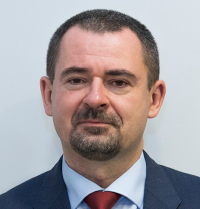 Day 1, 2024.12.09., 16:00-16:50 Parallel session 3: Potentials for healthy ageing from a transdisciplinary perspective – What is the role of the European RDI cooperation?
Day 1, 2024.12.09., 16:00-16:50 Parallel session 3: Potentials for healthy ageing from a transdisciplinary perspective – What is the role of the European RDI cooperation?Daniel K. Wójcik trained as a theoretical physicist in Warsaw, Poland. After two postdocs in physics at the University of Maryland and Georgia Institute of Technology he joined the Nencki Institute for Experimental Biology of the Polish Academy of Sciences where he currently runs the Laboratory of Neuroinformatics. The main focus of his group is development of computational tools for model-based data analysis spanning electrophysiological, behavioral and imaging data. The main interests of the group are source localization of electrical activity in the brain including epilepsy, behavior modeling including social aspects of learning, development of brain atlases and related tools, and study of electrophysiological signatures of psychosis. Dr. Wójcik is actively engaged on national and international level to push his agenda of solidifying theoretical and computational basis of neurobiology. He was a Treasurer of the Polish Neuroscience Society, a Director of the Organization for Computational Neuroscience, a member of the Committee for Higher Education and Training of the Federation of European Neuroscience Societies and the Polish representative to the International Neuroinformatics Coordinating Facility. He is currently the Chair of the Neurobiology Committee of the Polish Academy of Sciences and a member of the International Brain Research Organization – Pan-Europe Regional Committee.
| About | Registration | Program | Speakers | Accommodation | Getting here |






